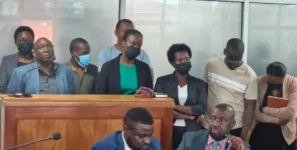Uganda's High Court blocked bail Monday for Tony Yawe and Mark Kasiiku, two key IT workers from the Finance Ministry. Judge Lawrence Gidudu called them "principal actors" in the massive Shs 60bn fraud case. The court decided these men directly changed electronic payment instructions in the government system.
The judge locked them up because they played a central role, failed to offer enough security, and participated in stealing huge amounts of money. Six other officials facing similar charges, including Accountant General Lawrence Semakula and Commissioner Jennifer Muhuruzi, did receive bail, but under tight rules.
These IT specialists allegedly used their access to Uganda's Integrated Financial Management System to redirect government cash. They changed payment files meant for Washington's International Development Association, and large sums ended up at unauthorized companies instead of their proper destination.
Court documents show $6,134,137.75 went to Roadway Co Ltd in Tokyo, $6,674,320.75 went to a fake "International Development Association" in Poland, and $8,596,824.26 moved illegally to MJS International based in London. The tech workers changed digital records to make these transfers happen.
Judge Gidudu explained that Yawe "raided the platform and changed a legitimate payment into an illegitimate one." He stated all other accused people suffered from Yawe's actions. Unlike their coworkers charged with mere negligence, these two actively altered government payment systems.
The court also found their bail security insufficient. They failed to provide substantial guarantees, such as land titles or cash deposits, that would ensure their return for trial. The judge worried that releasing the main players might hurt public trust in Uganda's justice system.
The six officials who did receive bail must make cash deposits between UGX 20 million and UGX 30 million. They surrendered their passports, must report monthly to the High Court Registrar, and cannot visit their offices without permission from the Treasury Secretary.
The case returns to court next April. Public pressure grows for accountability regarding corruption in Uganda's financial systems. Many citizens demand stronger digital security measures and better oversight to prevent future theft of government funds through electronic manipulation.
The judge locked them up because they played a central role, failed to offer enough security, and participated in stealing huge amounts of money. Six other officials facing similar charges, including Accountant General Lawrence Semakula and Commissioner Jennifer Muhuruzi, did receive bail, but under tight rules.
These IT specialists allegedly used their access to Uganda's Integrated Financial Management System to redirect government cash. They changed payment files meant for Washington's International Development Association, and large sums ended up at unauthorized companies instead of their proper destination.
Court documents show $6,134,137.75 went to Roadway Co Ltd in Tokyo, $6,674,320.75 went to a fake "International Development Association" in Poland, and $8,596,824.26 moved illegally to MJS International based in London. The tech workers changed digital records to make these transfers happen.
Judge Gidudu explained that Yawe "raided the platform and changed a legitimate payment into an illegitimate one." He stated all other accused people suffered from Yawe's actions. Unlike their coworkers charged with mere negligence, these two actively altered government payment systems.
The court also found their bail security insufficient. They failed to provide substantial guarantees, such as land titles or cash deposits, that would ensure their return for trial. The judge worried that releasing the main players might hurt public trust in Uganda's justice system.
The six officials who did receive bail must make cash deposits between UGX 20 million and UGX 30 million. They surrendered their passports, must report monthly to the High Court Registrar, and cannot visit their offices without permission from the Treasury Secretary.
The case returns to court next April. Public pressure grows for accountability regarding corruption in Uganda's financial systems. Many citizens demand stronger digital security measures and better oversight to prevent future theft of government funds through electronic manipulation.












